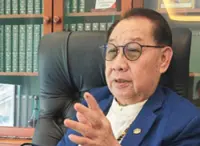KOTA KINABALU: Leaders in Sabah should focus on leaving a lasting legacy that raises the people's quality of life rather than merely politicising the Malaysia Agreement 1963 (MA63), says Datuk Seri Mohd Shafie Apdal.
While acknowledging the importance of Sabah's rights under MA63, Shafie stressed that they should not overshadow the pressing needs of Sabahans in terms of healthcare, education and economic opportunities.
“Why are we still debating MA63 when our hospitals are falling apart and children are dying from treatable diseases?” the Parti Warisan president said, urging Sabahans to move beyond slogans and grievances to use their votes for better governance and services.
“We must secure the future of our children. It’s not about me (as a politician), it is about them (the future generation).
"Even if we do not have degrees or big titles, at least let our children benefit from our struggles,” he told reporters at the Kota Kinabalu International Airport here on Wednesday (Apr 9).
The former chief minister stressed that Sabahans had matured and could not be easily misled.
“They are aware of issues like PTIs (illegal immigrants), the exploitation of resources, and much more. They already know.
"(To them) their (current) needs are more important, like water, jobs and security,” he said.
Shafie highlighted the dire health situation in rural areas, noting that many Sabahans, especially in places like Nabawan and Keningau, had died from preventable diseases because they lacked access to healthcare.
“How many children have died from diseases like heart failure, diabetes, or complications? They can’t afford to go to the clinic or Queen Elizabeth Hospital.
"I wonder where the national health budget, which was over RM50bil, has gone. Why aren’t these funds being used to address their needs?” he asked.
He pointed out that the hospital in Keningau was still in poor condition despite the large allocations for health.
“Why aren't these issues being discussed? Why is everyone focused on 1963 instead?” he said.
Shafie reminded Sabahans of the power of their vote and the importance of using it to secure their future.
He stressed that leaders should continue helping the less fortunate, especially in rural Sabah where many still live in hardship, regardless of election outcomes.





